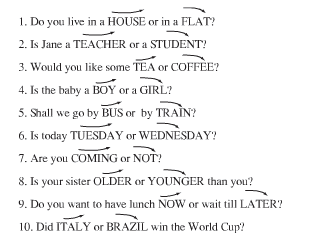Unit 16 lớp 12: The Association of Southeast Asian Nations-Language Focus
Bài học Unit 16 Lớp 12 The Association of Southeast Asian Nations phần Language Focus hướng dẫn các em điểm ngữ pháp về mệnh đề trạng ngữ chỉ thời gian.
Mục lục nội dung

1. Pronunciation Unit 16 lớp 12
Practise reading these sentence with rising-falling tone. Notice that prominent words are in capital leters
(Thực hành đọc những câu này với giai điệu lên xuống. Lưu ý rằng các từ nổi bật nằm trong các chữ cái in hoa)
2. Grammar Unit 16 lớp 12
Adverbial clause of time (Mệnh đề trạng ngữ chỉ thời gian)
2.1. Exercise 1 Unit 16 lớp 12
Complete each of the following sentences, using a suitable adverbial clause of time in the box. Use each clause once only
(Điền mỗi câu sau dùng mệnh đề trạng từ chỉ thời gian thích hợp trong khung. Dùng mỗi mệnh đề chỉ một lần)
Example
_____________________________ I'll invite her to our party.
When I see Mary tomorrow, I'll invite her to our party.
Guide to answer
1. She’ll phone you as soon as she arrives in Ho Chi Minh City.
(Cô ấy sẽ gọi cho bạn ngay khi cô ấy đến Thành phố Hồ Chí Minh.)
2. After the war was over, we started rebuilding the country.
(Sau khi chiến tranh kết thúc, chúng tôi bắt đầu xây dựng lại đất nước.)
3. They met a lot of people while they were on holiday.
(Họ gặp rất nhiều người trong khi họ đang đi nghỉ mát.)
4. Before you leave, don’t forget to turn off the lights.
(Trước khi đi, đừng quên tắt đèn.)
5. I’ll stay till you get back.
(Tôi sẽ ở lại cho đến khi bạn trở lại.)
6. We’ll come to see you whenever we are in Hanoi.
(Chúng tôi sẽ đến gặp bạn khi chúng tôi ở Hà Nội.)
7. There is a ganger of war as long as imperialism exists.
(Sẽ còn chiến binh chừng nào chủ nghĩa đế quốc còn tồn tại.)
8. Tom sang a merry song as he walked away.
(Tom đã hát một bài hát vui khi anh ấy đi.)
2.2. Exercise 2 Unit 16 lớp 12
Supply the correct tence form of the verbs inbrackets
(Cho dạng đúng của động từ trong ngoặc)
Guide to answer
1. When he (arrive) arrives, he will tell us about the match.
(Khi anh ấy đến, anh ấy sẽ kể cho chúng ta nghe về trận đấu.)
2. Before the head teacher (arrive) arrives, I’ll give the guests their tea.
(Trước khi giáo viên chủ nhiệm đến, tôi sẽ mời khách uống trà.)
3. Peter and John are going to play tennis tonight. While they (play) are playing, we’ll go to the beach.
(Peter và John sẽ chơi quần vợt vào tối nay. Trong khi họ chơi, chúng ta sẽ đi ra biển.)
4. Since they (get) got married, they have moved the house twice.
(Kể từ khi họ kết hôn, họ đã chuyển nhà 2 lần.)
5. As soon as I (finish) have finished, I’ll give you a call.
(Ngay khi tôi hoàn thành, tôi sẽ gọi cho bạn.)
6. After he (graduate) had graduated from university, he joined the army.
(Sau khi anh ấy tốt nghiệp đại học, anh ấy gia nhập quân đội.)
7. Can you look after the children while I (be) am out?
(Bạn có thể chăm sóc lũ trẻ trong lúc tôi đi ra ngoài được không?)
8. When I (read) have read this novel, you can have it.
(Khi tôi đọc xong cuốn tiểu thuyết này, bạn có thể lấy nó đi.)
2.3. Exercise 3 Unit 16 lớp 12
Combine two sentences, using one as an adverbial clause of time with the given conjunction
(Kết hợp hai câu, dùng một câu như mệnh đề chỉ thời gian với liên từ được cho)
Guide to answer
1. Let’s go out before it starts raining/ to rain.
(Hãy ra ngoài trước khi trời bắt đầu mưa.)
2. I'll give you my address when I have found somewhere to live.
(Tôi sẽ cho bạn địa chỉ của tôi khi tôi đã tìm thấy một nơi nào đó để sống.)
3. After he had done his homework, he went to bed.
(Sau khi làm bài tập về nhà, anh đi ngủ.)
4. We'll let you know as soon as we have made our decision.
(Chúng tôi sẽ cho bạn biết ngay khi chúng tôi quyết định.)
5. I haven’t met them since I left school.
(Tôi đã không gặp họ kể từ khi tôi rời trường.)
6. Robert suddenly began to feel ill while he was doing the examination.
(Robert đột nhiên bắt đầu cảm thấy mệt trong khi đang làm bài kiểm tra.)
7. Kate will come back home after she has finished the last semester.
(Kate sẽ trở về nhà sau khi cô kết thúc học kỳ cuối cùng.)
3. Practice Task 1
Choose the best option (Chọn câu trả lời đúng nhất)
1. _______ Peter gets here, we will congratulate him.
a. As soon as b. After c. No sooner d. Since
2. _______ I visit him, we talk about politics a lot.
a. Up to b. As far as c. Whenever d. Until
3. While she _______ breakfast, I set the table.
a. will make b. was making c. has made d. would be making
4. After Mariana _______ her exam, I _______ her out to eat.
a. was finishing/ would take
b. finished/ had taken
c. will finish/ have taken
d. has finished/ will take
5. Mrs. Pike _______ the door before the customers arrived.
a. had opened
b. will open
c. would open
d. has opened
6. She went on crying, with her head sunk into a pillow, and cried and cried _______ the pillow was wet through.
a. before b. after c. until d. while
7. _______ in Rome than he was kidnapped.
a. No sooner he arrived
b. Had he no sooner arrived
c. No sooner had he arrived
d. No sooner he had arrived
8. I have not seen my dog _______ the storm struck the community.
a. since b. while c. as soon as d. when.
4. Practice Task 2
Identify the underlined part that needs correction (Xác định phần gạch chân nào cần sửa)
1. When(A) it raining(B), I usually go(C) to school by bus(D).
2. I(A) learned a lot of Japanese(B) while(C) I am(D) in Tokyo.
3. I have not been(A) well(B) since I return(C) home(D).
4. I’ll(A) stay here(B) until(C) will you(D) get back.
5. When Sam was in New York(A), he(B) stays(C) with his cousins(D).
6. Last night(A), I had gone(B) to bed after(C) I had finished my homework(D).
7. I will call(A) you(B) before(C) I will come(D) over.
8. Ever since(A) I was(B) a child, I had been(C) afraid of(D) dogs.
9. By the time I left(A) my apartment this morning(B), someone(C) looked for(D) me.
10. Whenever(A) Mark will be(B) angry, his nose gets(C) red(D).
Để ôn tập các từ vựng với chủ đề "The Association of Southeast Asian Nations" và các điểm ngữ pháp có trong Unit 16, mời các em đến với phần trắc nghiệm Unit 16 Language Focus Tiếng Anh 12 và cùng luyện tập.
6. Conclusion
Qua bài học này các em sẽ tìm hiểu được điểm ngữ pháp: Adverbial clause of time (Mệnh đề trạng ngữ chỉ thời gian)
Mệnh đề trạng ngữ chỉ thời gian là một dạng mệnh đề phụ cho biết thời điểm diễn ra một điều gì đó. Mệnh đề trạng ngữ chỉ thời gian thường bắt đầu bằng những từ: when, before, after, as soon as, until, while.
When the phone rang, the baby woke up.
(adverbial clause) (main clause)
KHÔNG dùng thì tương lai trong mệnh đề trạng ngữ chỉ thời gian. Khi muốn nói về tương lai, chúng ta dùng thì hiện tại đơn.
They are going to come soon. I'll wait here until they come.
Thì hiện tại tiếp diễn được dùng trong mệnh đề trạng ngữ chỉ thời gian để diễn đạt một hành động đang diễn ra trong tương lai.
While I am traveling in Europe next year, I'm going to save money by staying in youth hostels.
Thì hiện tại hoàn thành được dùng trong mệnh đề trạng ngữ chỉ thời gian để nhấn mạnh rằng một hành động sẽ được hoàn tất trước một hành động khác.
I will go to bed after I have finished my work.
Tham khảo thêm
- doc Unit 16 lớp 12: The Association of Southeast Asian Nations-Reading
- doc Unit 16 lớp 12: The Association of Southeast Asian Nations-Speaking
- doc Unit 16 lớp 12: The Association of Southeast Asian Nations-Listening
- doc Unit 16 lớp 12: The Association of Southeast Asian Nations-Writing

.png)
